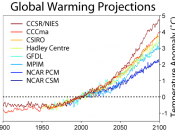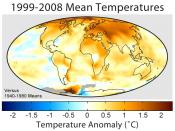The Skeptical Environmentalist: Measuring the Real State of the World is an informative yet controversial, extensive yet imperfect book. The author, Bjorn Lomborg, stresses that the state of the world, as a whole, and human life in general is getting better, not worse, and that the alarmist claims of some environmentalists are exaggerated. Lomborg is an expert in statistics, with a background in political science. Thus, he presents an extensive, well-supported and up to date overview of the human and environmental state of the world, including issues such as life expectancy, infant mortality, infectious disease rates, food availability, and dietary habits. Lomburg's book seems to be geared towards thwarting fear of an environmental doomsday, and paints a much brighter picture--that human prosperity is good and getting better. Many environmentalists of course contend that human prosperity is occurring at the great expense of the environment in general; however, Lomborg's general assertion is that the effect of the populace on the world is declining, not increasing, even as humans increase (e.g.
due to better technology, more efficient use of resources, recycling, research, alternative materials, environmental priorities, etc). In addition to human prosperity, Lomburg discusses other issues such as air pollution, acid rain, indoor pollution, allergies and asthma, water pollution (eg Exxon Valdez and other oil spills), and waste issues. Other areas of concern such as forest cover, energy resources, non-energy resources, and water availability and quality are covered. Furthermore, future concerns are explored, like cancer rates and causes, pesticide usage and effects, biodiversity, extinction, and global warming--its causes and consequences. Along with each category, the author gives a copious tables and graphs containing relevant information to support his claims. Unfortunately, much of the data used by the environmental industry does not measure that which it is claimed to measure, asserts Lomburg.



Awesome
Great report. i have a copy of this book and read it, well sections of it, regularly. Environmantalism IS a big deal, but sometimes things just get out of hand.
0 out of 4 people found this comment useful.